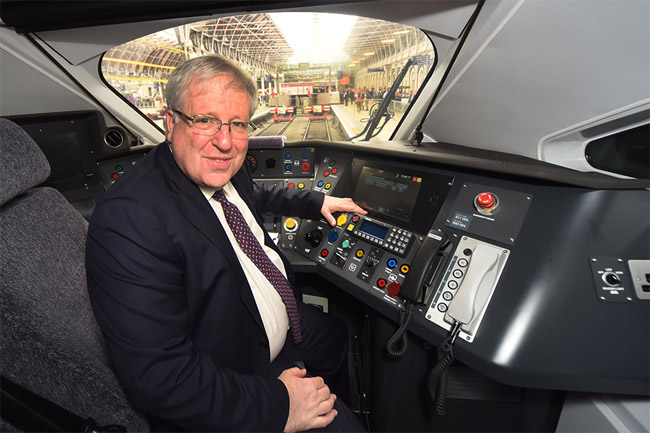Ministers have attempted to distance themselves from the continued disruption to a couple of major long distance rail routes, following the discovery of cracks in Class 800 Series Hitachi trains.
When the Department for Transport (DfT) first ordered the trains, ministers promised to improve reliability ‘by a factor of five’ but on Sunday government officials said they had been forced to ask 'the rail industry to urgently set out a comprehensive plan to resolve prolonged disruption'.

Mr McLaughlin 'looks back to the future' in 2016
Most of GWR’s fleet and ‘a significant number’ of LNER and TransPennine Express trains have been taken off the network to undergo a full and rigorous inspection, after checks of the Hitachi fleet early on Saturday morning identified cracks on part of the chassis of some trains.
GWR and LNER firms have said disruption is expected to continue into this week.
The DfT said that ‘to combat the expected continued delays’, rail minister Chris Heaton-Harris ‘has requested a comprehensive plan from Hitachi to identify the extent of the cracking and whether carriages can still run safely with them’.
It said Hitachi ‘will also be expected to set out a comprehensive inspection regime guaranteeing that safety is prioritised, building on the work that is already underway’.
In response to an enquiry from Transport Network, the DfT would not state who would pay for these works.
Mr Heaton Harris said: ‘I have directed the rail industry to urgently set out a comprehensive plan to ensure services can safely resume as soon as possible. I expect operators to explore all options for replacement services to help people complete their journeys, and have asked Hitachi for a safety inspection plan, as well as longer term repair strategy.
‘Our focus is to ensure trains are returned to service as quickly as possible, once they are fully approved as safe. Only then can we start to rebuild a reliable and punctual timetable for passengers.’
The trains were in fact ordered by the DfT under its £5.7bn InterCity Express Programme (IEP).
In 2013, announcing a £1.2bn order ‘for more state-of-the-art trains to transform rail travel’ on the East Coast Main Line, now run by the DfT under the LNER brand, ministers said the trains would ‘deliver significant benefits to passengers, including …improving train reliability by a factor of five’.
Then transport secretary Patrick McLoughlin (pictured) in 2016 hailed the unveiling of GWR’s first state-of-the-art Class 800 as offering numerous passenger benefits.
Norman Baker, now of Campaign for Better Transport, was a DfT minister when the ordering of the trains was announced. He said: ‘The problems faced by passengers this weekend show how vital a smooth-running rail network is in keeping the country moving. The issue with these trains must be urgently addressed, along with other barriers to people returning to the railways.’
Register now for full access
Register just once to get unrestricted, real-time coverage of the issues and challenges facing UK transport and highways engineers.
Full website content includes the latest news, exclusive commentary from leading industry figures and detailed topical analysis of the highways, transportation, environment and place-shaping sectors.
Use the link below to register your details for full, free access.
Already a registered? Login